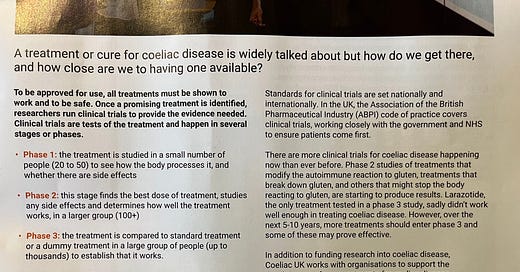Some context about cœliac disease (through my personal history)
Coeliac disease is a condition where your immune system attacks your own tissues when you eat gluten. This damages your gut (small intestine) so your body cannot properly take in nutrients.1
I’m a cœliac2 . Since my diagnosis over a decase ago I’ve been a member of Cœliac UK. I mainly read their magazine for recipes and to learn about new gluten-free food products. It includes research updates which I usually skip because the research seems low quality and unexciting. I can understand this. We already have the big result for cœliac disease: a gluten-free diet is an effective treatment.
After diagnosis, I was actually reluctant to eat gluten-free food. It’s so inconvenient (particularly when travelling or eating with friends), so expensive, and less nice than normal food3. So I decided to give it a half-hearted go, with the intention of giving up. As it happened, the gluten-free diet changed my life: I went from constant brain-fog and poor concentration to finding previously-difficult mental tasks easy and having loads more energy. It was like developing a superpower, so I stuck with it. (I often wonder if everyone else feels like this all the time.)
Despite the often-quoted “1-in-100-are-affected” statistic, I know very few cœliacs – three that I can think of, though I’ve met another 5 or 10. Of all of them, I’d rate myself as the joint-first – maybe second – strictest about gluten-free diet4. Yet I am ‘poorly controlled’. Every time I have a blood test, my IgA anti-tissue transglutaminase (ATTG) antibodies are above the target range (though I take the win that these days the measurement is on-the-scale). A gluten-free diet should prevent this, but apparently I’m particularly sensitive and imagine I get minor cross-contamination every now and then (hard to avoid completely when you have kids).
Testing a cure
A recent Cœliac UK magazine contained a research feature on testing a cure for cœliac disease. Here it is (apologies if it’s hard to read on a phone). I had no idea there was research into a cure. There has already been a phase III study‽ Watch out Big Food; Big Pharma is coming for ya!
IMO this is a good piece of communication for the charity’s audience. Reading it, I got to wondering how you would test a cure in phase III.
Imagine for a moment that we did not know about the gluten-free diet and all cœliacs were symptomatic all the time. Let’s say the candidate “cure” is a pill. Testing it would be relatively easy: we would randomize people between placebo and active pills and compare their subsequent/ongoing disease.
Back to the real world5 where we already know about the effectiveness of a gluten free diet, things get a bit more complicated. People like me, with poorly controlled disease, might be the first population of interest. The phase III trial could tell people to keep going as they are but randomize between the active or placebo pills and compare subsequent measurements of disease. Pretty straightforward. The problem is that the intervention in this trial doesn’t correspond to what cœliacs want. What we want is to be able scrap our gluten-free diet altogether so we don’t have to spend so much energy, time and money on it! Adding a cure to a gluten free diet would just add a layer of inconvenience.
This is where planning a phase III trial gets tough. We have an intervention that is essentially completely effective (for most; admittedly it’s not perfect for everyone). We cannot beat it, so the aim is non-inferiority. To test a cure would be to ask some people to stop the completely effective treatment and try something that is not known to be effective. The potential reward is high, but the risk of participation is also high. If the proposed cure is not effective, you experience an immune response to gluten taking you back to the brain fog, bowel problems, possible anæmia, etc. for several months. No thanks. I’ll let other people participate and benefit from the results.
To test a possible cure in a population with well-controlled symptoms this could be a good case for single-arm phase III trials (never thought I’d hear myself say that). Because the diet-treatment is essentially 100% effective, it’s a very unusual case where you don’t really need the control arm. Fight me.
Finally, newly-diagnosed people would be a great group to run a phase III trial in (here with two arms). At the point of diagnosis, randomize between “possible cure” and “gluten-free diet”. Immediately after diagnosis I would have been delighted to consent to participate in a such a trial!
I’ve never been hopeful for a cure, and I’m still not, but the slim possibility is exciting. I’m interested to see if future phase III trials will target the poorly controlled, well controlled, or newly diagnosed, and what design those trials use.
From https://www.nhs.uk/conditions/coeliac-disease/ accessed 23 May 2025
Seriously, I’ve gone all-in on ligatures this time. Hope you appreciate the interrobang.
The perception that gluten-free food is not very nice has changed a lot in the last decade. Special shoutout to Katarina Cermelj in this respect https://theloopywhisk.com/about-me/.
Things like like having separate butter, washing your hands every time you touch gluten (e.g. handling the kids’ food) or anything that has touched gluten, having separate chopping boards for gluten-free vs. gluten, not eating or drinking things if you’re unsure (which can be massively socially awkward), being aware of what other people have touched after handling gluten.
Here I mean real world in its literal sense, rather than the sense it’s used in the terms real world evidence and real world data.




